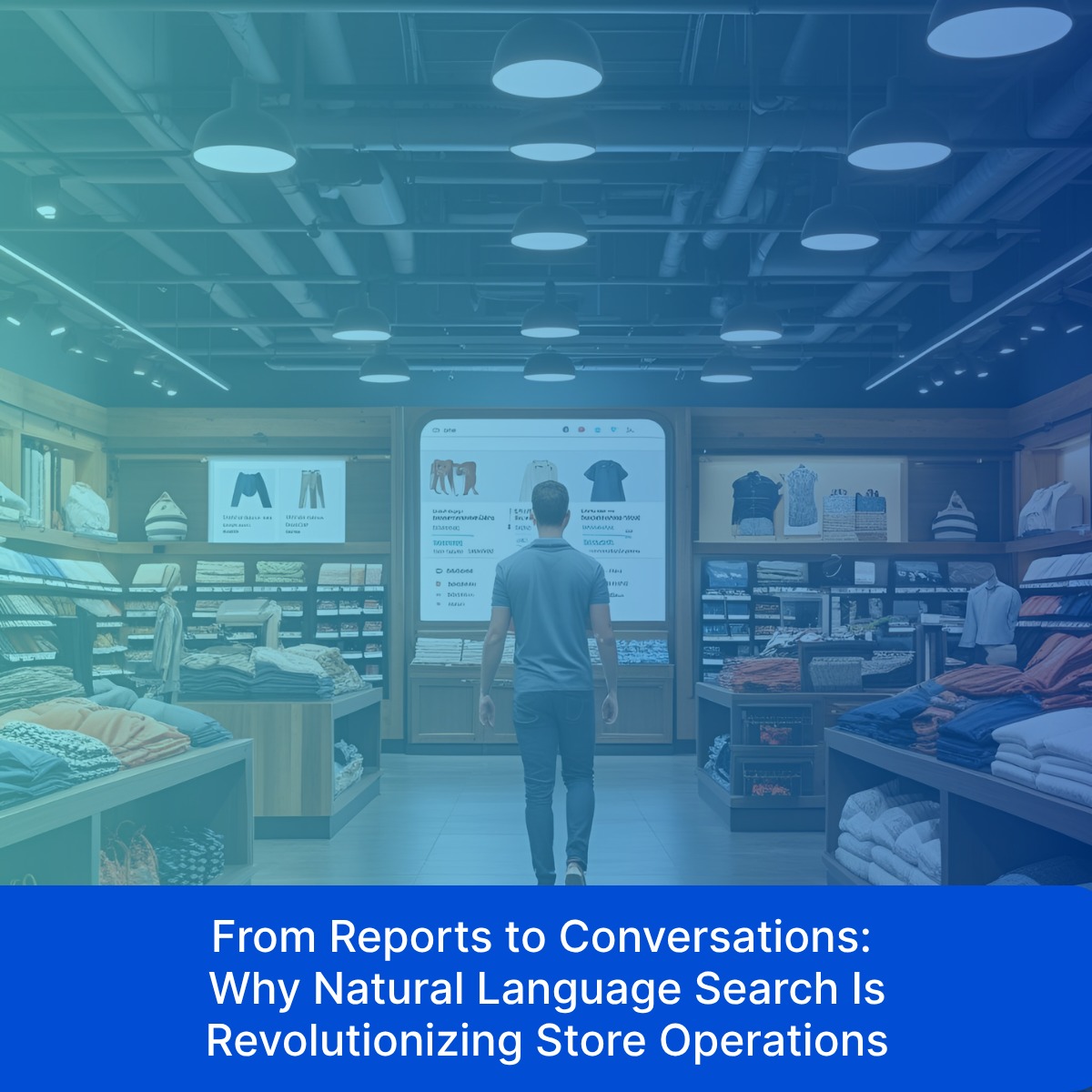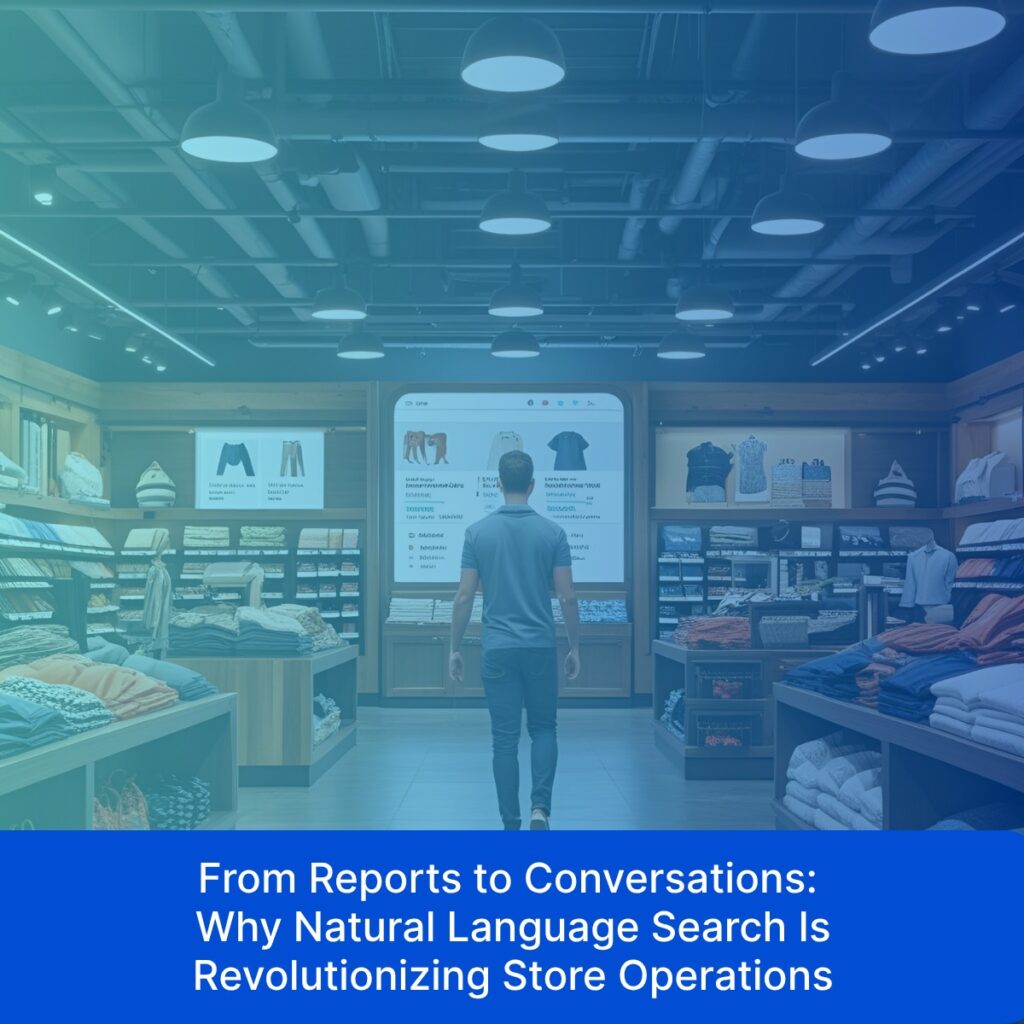Natural Language Search Is Revolutionizing Retail Store Operations
August 6, 2025

Store managers are drowning in data. Every day, they’re presented with dozens of reports, dashboards, and spreadsheets that supposedly hold the keys to better performance. Yet despite having more information than ever before, many managers still struggle to extract actionable insights quickly enough to make meaningful changes. The problem isn’t the data—it’s how we access it.
Natural language search is changing this paradigm by tapping into fundamental aspects of human psychology and cognition. When store managers can ask “Why did sales drop 15% last Tuesday?” instead of navigating through multiple reports, they’re not just saving time—they’re engaging with their business in a fundamentally more intuitive and effective way.

Market Growth Reflects Real Business Value
The numbers tell a compelling story about this transformation. The global natural language processing market was valued at approximately $27-30 billion in 2024 and is projected to reach $161-439 billion by 2030, with growth rates ranging from 20-38% CAGR depending on market segment. Meanwhile, the natural language generation market size was valued at $655.3 million in 2023 and is projected to grow at a CAGR of 21.8% from 2024 to 2030.
This explosive growth reflects a fundamental shift in how businesses want to interact with their data, driven by proven ROI across retail operations from inventory management to customer service.
The Psychology Behind the Revolution
Cognitive Load and the Translation Problem
The human brain has limited processing capacity. Traditional reporting systems demand that managers translate their business questions into the language of spreadsheets and dashboards. This translation process creates friction at the exact moment when speed and clarity are most critical. A manager wondering about inventory levels shouldn’t need to remember which tab contains turnover rates or how to filter by product category.
When store managers spend their mental energy deciphering complex reports and cross-referencing multiple data sources, they experience cognitive overload, leaving less mental bandwidth for the strategic thinking that actually drives results.
Natural language search eliminates this cognitive burden entirely. When managers can simply ask “Which products are moving slowly this month?” they can focus their mental energy on interpreting the answer and taking action, rather than wrestling with the interface.
The Power of Conversational Intelligence
Humans are wired for conversation. We’ve evolved to process information through dialogue, questions, and storytelling. Natural language search transforms data interaction into a conversation, enabling managers to engage in active inquiry rather than passively consuming pre-built reports. They can ask follow-up questions, drill down into specifics, and explore hunches in real-time.
Consider the difference:
- Traditional approach: The manager opens the weekly sales report, notices an anomaly, switches to the inventory system, cross-references it with the staffing schedule, and then opens the customer feedback dashboard to understand the context.
- Natural language approach: Manager asks, “Why were sales down on Thursday?” The system responds with staffing levels, inventory issues, and customer feedback in context. Manager immediately follows up with “What can we do to prevent this next week?”
From Analysis Paralysis to Question-First Thinking
When faced with overwhelming options, people often freeze. Traditional dashboards present dozens of metrics simultaneously, forcing managers to decide which data points deserve attention. Natural language search flips this dynamic—instead of choosing from overwhelming options, managers start with their actual business questions and let the system surface relevant information.
This question-first approach aligns with how successful managers naturally prioritize. They don’t wake up wondering about “month-over-month percentage changes in SKU velocity”—they wonder about specific problems and opportunities in their stores.
The Emotional Transformation: From Intimidation to Empowerment
Many store managers, particularly those without extensive technical backgrounds, find traditional analytics tools intimidating. The fear of “clicking the wrong thing” or misinterpreting a complex chart creates psychological barriers to data engagement.
Natural language search removes these barriers by meeting managers where they already are—in natural conversation. When the interface feels familiar and non-threatening, managers are more likely to explore data deeply and regularly. This psychological shift from intimidation to empowerment is crucial for creating true data-driven cultures.
Building Intuitive Pattern Recognition
Humans excel at pattern recognition when information is presented in familiar formats. Natural language responses contextualize data in ways that resonate with a manager’s existing mental models. Instead of presenting “inventory turnover rates by category,” a natural language system might explain “Your winter clothing is moving 30% slower than last year, but accessories are flying off the shelves.” This narrative approach helps managers quickly grasp not just what is happening, but why it matters.
Real-World Success Stories
Walmart: Conversational Data at Scale
Walmart collects 2.5 petabytes of unstructured data from 1 million customers every hour. Their investment in natural language capabilities has enabled store managers to quickly query customer behavior patterns, inventory levels, and sales trends without requiring technical expertise, contributing to their ability to process massive amounts of customer data and translate it into operational decisions at the store level.
The Home Depot: Voice-Enabled Operations
The Home Depot has pioneered natural language search through several innovations:
- Voice Search Integration: Both customers and store associates can access inventory information and customer data through voice commands
- Real-Time Analytics: Engineers have adapted BigQuery to monitor and analyze application performance data across all stores, enabling managers to ask natural language questions about performance metrics and receive immediate insights
- Unified Customer Profiles: This approach helped increase personalized campaigns by 62% year over year, with store managers now able to query customer data using natural language to understand shopping patterns
Meijer: From Excel to Conversational Analytics
After transitioning from Excel spreadsheets to Power BI with natural language capabilities, Meijer experienced streamlined data management, improved sales trend analysis through conversational queries, and enhanced operational efficiency with real-time inventory insights accessible through natural language.
Technology Platforms Driving Results
Microsoft Power BI: Leading the Conversational Analytics Revolution
Microsoft’s Power BI Q&A feature represents one of the most widely adopted natural language search solutions in retail. The system provides relevant and contextual suggestions, offering immediate feedback and results as users type.
Real-world retail queries include:
- “Which sales has the highest revenue?”
- “Show me sales in the last year”
- “Which customers bought cheese and wine?”
- “Show me top 10 countries/regions by sales ordered by country/region code”
The system automatically interprets questions and plots fields to the correct visualization axis, supporting various data source configurations including Import mode, Live connect with Analysis Services, and DirectQuery with Azure services.
Industry-Specific Applications
- E-commerce Integration: Google reports a 60% increase in natural language queries from 2015 to 2022, extending to internal retail operations where managers expect web search-like interactions with business intelligence tools
- Voice-Activated Management: Voice assistants enable hands-free access to critical information while managers are on the store floor
- Automated Report Generation: AI-powered natural language generation creates plain English summaries of complex analytics for store managers
Measuring the Impact
Productivity Metrics
Organizations implementing natural language search report significant improvements:
- Time to insight: Reduction from hours to minutes for common analytical tasks
- Question frequency: More personalized, relevant results increase user engagement
- Decision speed: Faster identification and response to operational issues
- Data democratization: Increased analytics usage across all experience levels
Business Performance Indicators
- Conversion Rate Improvements: Faster access to insights leads to better decision-making and improved store performance
- Operational Efficiency: Machine learning simplifies complex KPI analysis, freeing teams to focus on strategy while algorithms handle merchandising work
The Future of Store Operations
Natural language search represents more than a technological upgrade—it’s a fundamental shift toward more human-centered business intelligence. By aligning data interaction with natural human psychology, we’re making managers more effective leaders and decision-makers.
Emerging Trends
- AI-Powered Insights: Gartner expects that by 2025, 80% of data and analytics will incorporate natural language capabilities
- Real-Time Processing: Query engines can parse complex questions and build instant responses
- Personalized Analytics: Manager dashboards are becoming personalized based on individual roles, responsibilities, and preferences
The stores that embrace this conversational approach to data will have a significant advantage. Their managers will be more engaged, more informed, and more agile in responding to changing conditions. They’ll spend less time wrestling with technology and more time focusing on what they do best: creating exceptional customer experiences and driving business results.
The question isn’t whether natural language search will transform retail operations—it’s whether your organization will be an early adopter or a late follower. The psychological advantages are clear, the technology is available, and the competitive benefits are substantial. The conversation with your data can begin today.
The most successful store managers have always been those who ask the right questions at the right time. Natural language search simply makes it easier to get the answers they need to drive exceptional results.
https://www.projectpro.io/article/how-big-data-analysis-helped-increase-walmarts-sales-turnover/109
https://addendanalytics.com/blog/case-study-power-bi-and-meijer
https://www.grandviewresearch.com/industry-analysis/natural-language-processing-market-report